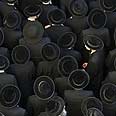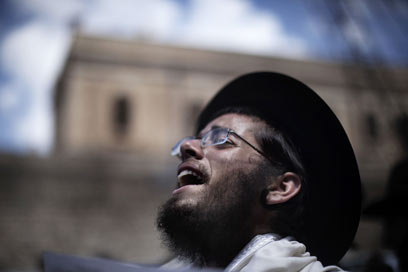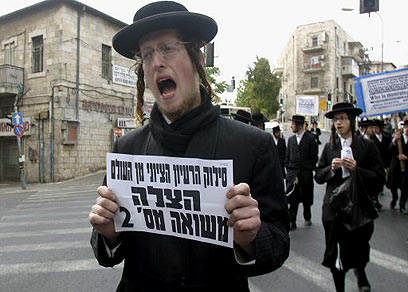
Dodging the system
While many haredi yeshiva students find a way out of military service through 'Torah is his profession' rule, those that can't find another solution – through mental health officer. 'I told them I tried to commit suicide, but it wasn't enough, so I told them I hate Arabs,' says one repentant dodger. Even yeshiva rabbis are concerned
How hard is it to get out of military service in Israel? Not that hard - If you are ultra-Orthodox. When God won't help you get an exemption, the mental health officer will. Over the past year alone, a third of those who received a military exemption for mental health reasons were haredim.
That is quite a large chunk of the population relatively speaking when you consider the fact that the haredi sector is only 14% of Israel's total population.
The phenomenon is well known within the haredi community and in many cases comes about due to heavy pressure from home on those who have, in spite of everything, chosen to wear the uniform and who in the end, had to give in and leave the army.
K. A young man in his twenties studied at a haredi yeshiva in the center of Israel. The feeling that yeshiva life wasn't for him had been increasing over the years, and he sought to enlist. But when his family found out that he "suffers" from high motivation levels, they did everything in order to make him change his mind.
"Until I was 20 I was exempt under the 'Torah is his profession' rule. At that point, without my yeshiva's or my family's knowledge, I asked the IDF to cancel the exemption and enlist in the Nahal Haredi. The IDF sent my mobilization order to my parents' house and that was how they found out.
"For them it was like a second holocaust. The head of my yeshiva pressured me into changing my mind, and it was a period in my life where I was dependent on my close environment, not independent as I am now. Everyone held endless talks with me, trying to persuade me to change my mind. I remember how the head of my yeshiva once told me: 'We just saw a group of soldiers, and heaven help us if you should be like them'."

Haredim at Tel Hashomer Reception Base (Photo: Ofer Amram)
Everyone in K's immediate surroundings refused to let go and not long after, he was back at the reception base – this time to make a swift return to civilian life. The methods for obtaining the superfluous exemption were well known to him.
"It's a very well known 'solution'. I told them that I tried to commit suicide when I was younger, but it wasn't enough. When the mental health officer said he wouldn't release me, I told him I hated Arabs – so he lowered my medical profile to 21. Later on, a committee approved it, and I was out."
The pressure was off, but as time went by, K started to feel that he made a grave error in giving in to his parents' and rabbis' demands. "Six months later I realized what an idiot I had been. It was very hard for me to study, and that held me back in life. I decided to present an appeal over my IDF exemption and of course, my parents found out.
"The army was in no rush to give me back my original medical profile, and stipulated that I needed a psychiatrist's authorization. I brought all the necessary paperwork, and only a few years later did I manage to repeal the exemption. But even then, they didn’t want to allow me to go to the Nahal Haredi."
Though a few years have past since K.'s saga began, it is far from over. He is expected to finally enlist in the IDF soon. Yet while he was battling for his right to serve, he saw how his yeshiva friends were evading military service one after the other.
"In my yeshiva, many students were released one after the other, but it isn't a regular yeshiva, since most have the 'Torah is his profession' rule. Students that use the mental health clause are usually just tired of having to go sign in at the unemployment line to get their assurance of income, or they want to work or go abroad."
Yet K believes that recent years have brought a change in the way the haredi community treats the enlistment issue, which is becoming more and more acceptable. "I keep hearing about more and more that enlist. Quite a few of those who had been discharged through the mental health clause, later regretted their decision.
"It was an act of youthful stupidity. They had no idea how much it would screw up their lives. I'm paying for it, but soon, I'll be mobilized, in spite of it not coming at the best time. I should have done it years ago.
Taking mental health clause for a ride
Unlike K, there are those who put in quite a lot of effort to receive their exemption, and not because of outside pressure. M, a haredi yeshiva student who was discharged through the mental health clause a few years ago, explained that he did so out of a wish to escape.
"I was going through a tough time in my life, emotionally. I wasn't really going to the yeshiva much so I received my mobilization orders. I flew out to the Far East, and today I feel it's behind me, I started a new life."

Yeshiva students evading military one after the other (Photo: AFP)
While their backgrounds are different, they both feel the same regret that caused K to do everything he can to go back and serve in the military. "I went to the military authorities explained my situation and got discharged. Today I am in a better place, but I'm 30 years old. If it was possible, I might still enlist now. What happened then was a momentary lapse," M said.
The data that pointed to the large number of haredim receiving military exemptions surprised both K and M. "I think the numbers must be wrong, because not everybody who dodges service is a haredi yeshiva student. There are plenty who put a yarmulke on their heads and hitch a ride with the haredim. The 'Torah is his profession' arrangement is excellent, but only for those who truly study," M added.
A, a chastity squad activist and a well known figure in the haredi world, explained that the phenomenon comes and goes in accordance with the haredi community's attitude towards the State of Israel. "They see it as 'deceiving the landowner'. Once it was Tsarist Russia and the Otoman Empire, today it is the Zionist State.
"They see no difference between the two. For most haredim, enlisting in the IDF is not just about being a soldier wasting time he could have used for studying Torah; it's a statement that ostensively declares loyalty to the Zionist state and the IDF. There is nothing easier than going to a psychiatrist and making faces."
Yet in A's opinion, the State is responsible for the ongoing expansion of the phenomenon over the years. "The authorities cooperate with the system. Ben Gurion openly gave the green light for the 'Torah is his profession' rule. Everybody knows that what happened and is still happening at the mental health officer's office is a joke, and yet they are still discharged."
Surprisingly, A said that in spite of the alienation exhibited by the haredim outwardly, the expansion of the phenomenon has managed to concern rabbis in the haredi sector as well.
"The numbers have grown, and it has become a burden. Most of the students entering the education system today are haredim, and though they won't say so in public, the rabbis are worried about the situation. They prefer that those who choose to leave the yeshivas remain within some sort of structured environment, even if it is a military one.
Rabbis concerned
Haredim today are exposed to the modern world. Nearly every haredi has been exposed to the internet, due to a cutbacks in child benefits women are forced to work, and when you need to earn a living – that also leads to enlisting in the army."In light of the data over the high number of haredim receiving military exemptions due to the mental health clause, sources within the IDF wished to note that "it is important to remember that some of those declaring mental health issues are not making a false declaration.

Once Tsarist Russia, today Zionist State (Photo: Reuters)
"There is no doubt that the motivation in this sector of society is relatively low, which is why you see more haredim getting a discharge for mental health reasons than in any other sector of the population where even if the data is similar, they make an effort to enlist."
On the other hand, the sources made it clear that in their opinion, the main problem was not those who sought to dodge military service through discharges – but the legal arrangement that gives all yeshiva student's a way out of military service.
"The number of teens who don't serve in the military due to the 'Torah is his profession' rule is still the highest. It is extremely worrying because their numbers are rising at a dangerous level. The issue needs to be addressed."
Roni Sofer, Hanan Greenberg and Kobi Nahshoni contributed to this report
- Follow Ynetnews on Facebook










